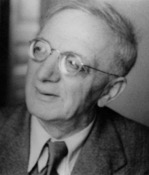
Alfred Döblin
Alfred Döblin (1878-1957) was an assimilated and ambivalent Prussian Jew, a psychiatrist, critic, essayist, mystic, and novelist. His works are considered classics of German modernism and include The Three Leaps of Wang Lun (1915), Wallenstein (1920) and Berlin Alexanderplatz (1929). When he fled Germany for Paris in 1933, he was one of the country's best-known authors and a serious contender for the Nobel Prize. His refugee trajectory, documented in Destiny’s Journey (1949), led through Marseilles, Lisbon and New York to the colony of European exile intellectuals in Hollywood. His entourage included his wife and children as well as the woman who was his long-time lover. In 1941, after a long period of religious searching, he converted to Catholicism. In a review of Destiny’s Journey, critic John Simon wrote: “Döblin was not at peace with any religion, philosophy, political theory, literary school or style. Though a Jew, he early on rejected many aspects of Judaism. Though a socialist, he had no use for Marx and militancy. Though a Westerner, Eastern mysticism played a substantial role in his thought.” Alfred Döblin returned to Germany in 1945 at the war's end. He could not adjust to life there and, with his wife, resettled in Paris in the early 1950s. (photo: S. Fischer Verlag GmbH)
Click on the cover for details about the eBook:








